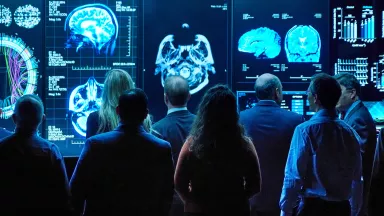What Is Auditory Processing Disorder?
Auditory processing disorder (APD) is a disruption in the way the brain processes what an individual is hearing. Though hearing-related tasks are impaired, this auditory disorder is not a form of hearing loss.
An audiologist will typically diagnose APDs as one of the following types:
- Auditory discrimination: Problems distinguishing between distinct, separate sounds leading to delays in learning to read
- Auditory figure-ground discrimination: Problems picking out specific sounds among background noises
- Auditory memory: Problems remembering something heard recently as well as long ago
- Auditory sequencing: Struggling to remember and understand words in a specific order
Learning disabilities are characterized by significant limitations both in intellectual functioning and in adaptive behavior as expressed in conceptual, social and practical adaptive skills. Such disabilities typically originate before age 18.
Over the past decade, important changes have been made in disability terminology, resulting in the renaming of mental retardation to intellectual disability. Though this disability, which has a major impact on a patient’s life, is sometimes hard to diagnose, medical science has developed a better understanding of its causes.
Learning disabilities are disorders that affect the ability to:
- Understand or use spoken or written language
- Do mathematical calculations
- Coordinate movements
- Direct attention
Learning disabilities occur in very young children, yet they are usually not noticed until the child reaches school age. Learning disabilities can be lifelong conditions with a range of impacts and accommodation requirements.
In some people, several overlapping learning disabilities may occur, with frequent overlap of attention-deficit disorder (ADD) and attention-deficit/hyperactivity disorder (ADHD) diagnoses. Other people may have a single, isolated learning problem that has little impact on their lives.
There is some incidence of learning disabilities in adults, such as adult-onset dyslexia. This usually occurs as a result of brain injury or dementia. However, some adults with dyslexia were never diagnosed with dyslexia as children or adolescents. Dyslexia can be inherited; recent studies have identified a number of genes that may predispose a person to developing dyslexia.
Types of Auditory Processing Disorder
The five types of auditory processing disorder include:
- Organizational: Challenges with remembering the order of information as well as having a hard time focusing in noisy environments
- Hypersensitivity: Adverse reactions to sounds, often repulsed by the sounds of eating, chewing and slurping; sensitive to sound, and often diagnosed as misophonia or hyperacusis
- Decoding: Trouble interpreting sounds into words
- Integration: Challenges with multi-tasking, e.g., listening and writing notes at the same time
- Prosodic: Trouble interpreting implied meaning, inflection and tone; often speak in monotone
Causes of Auditory Processing Disorder
Most developmental disabilities are thought to be caused by a complex mix of factors. These factors include genetics, parental health and behaviors (such as smoking and drinking) during pregnancy, complications during birth, infections the mother might have during pregnancy or the baby might have very early in life, and exposure of the mother or child to high levels of environmental toxins, such as lead. For some developmental disabilities, such as fetal alcohol syndrome, which is caused by drinking alcohol during pregnancy, we know the cause. But for most, we don’t.
A range of factors, including faulty genes, head injuries, birth complications and frequent ear infection—all of which affect an area in the brain called the auditory cortex—may cause auditory processing disorder.
Risk Factors for Auditory Processing Disorder
Most developmental disabilities are thought to be caused by a complex mix of factors. These factors include genetics, parental health and behaviors (such as smoking and drinking) during pregnancy, complications during birth, infections the mother might have during pregnancy or the baby might have very early in life, and exposure of the mother or child to high levels of environmental toxins, such as lead. For some developmental disabilities, such as fetal alcohol syndrome, which is caused by drinking alcohol during pregnancy, we know the cause. But for most, we don’t.
Developmental disabilities begin any time during the developmental period and usually last throughout a person’s lifetime. Most developmental disabilities begin before a baby is born, but some can happen after birth because of injury, infection or other factors.
Screening for & Preventing Auditory Processing Disorder
Healthcare providers can play an important part in collaborating with schools to help a child with learning disorders or other disabilities get the special services they need. The American Academy of Pediatrics (AAP) has created a report that describes the roles that healthcare providers can have in helping children with disabilities, including learning disorders.
During an APD evaluation, a range of tests to assess auditory processing abilities is performed. This helps to diagnose auditory processing disorders and come up with effective intervention strategies. The specific tests selected will depend on the age of the child, the referring complaint, test reliability and validity, and the specific auditory process being assessed. An initial audiological evaluation to confirm normal hearing sensitivity and that tests peripheral hearing including acoustic reflex testing, otoacoustic emissions and speech-in-noise testing prior to the testing central auditory processing. A detailed case history and observational checklists filled out by the parent and classroom teacher will also help to ensure a thorough assessment of the child's condition.
Signs & Symptoms of Auditory Processing Disorder
Parents are typically the first to recognize consistent patterns in behavior that may lead them to having their child screened for learning disabilities like auditory processing disorder (APD). If your child struggles to hear others over background noise, understand speech or distinguish between sounds, you might consider working with healthcare professionals to screen for APD.
Any combination of the following symptoms may be signs of APD:
- Delayed response to instructions or verbal requests
- Delays in speech or language development
- Struggles with sounding out words while learning to read
- Memory issues with verbal commands or instructions
- Difficulty understanding when another is speaking, often requiring repetition
- Struggling to orally express oneself, combined with similar issues with written expression
Diagnosing Auditory Processing Disorder
Children with learning disorders may feel frustrated that they cannot master a subject despite trying hard, and they may act out, act helpless or withdraw. Learning disorders can also be present with emotional or behavioral disorders, such as attention-deficit/hyperactivity disorder (ADHD), or anxiety. The combination of problems can make it particularly hard for a child to succeed in school. Properly diagnosing each disorder is crucial so that the child can get the right kind of help for each.
Many children may struggle in school with some topics or skills from time to time. When children try hard and still struggle with a specific set of skills over time, it could be a sign of a learning disorder. Having a learning disorder means that a child has difficulty in one or more areas of learning, even when overall intelligence or motivation is not affected.
Children with a displayed lack of achievement may be diagnosed just as commonly as those of average or above-average intelligence. Discrepancies may exist from one type of diagnosis to another, with variations depending on the individual. Learning disabilities and deficiencies in information processing can make learning and communication challenging or impossible.
A series of listening tests are performed that require focus and attention from your child that will assess different aspects of the auditory system. These tests are performed in a sound- and distraction-free room, and require them to respond to the administrator with a series of pre-described signals or button pushing.
Treating Auditory Processing Disorder
Parents of children diagnosed with APD should work with professionals who will teach special skills and tools to help reorganize and improve the brain’s processing of sound. Additional accommodations may be required in the workplace, at home and in the classroom, such as computer-assisted programs and work with speech therapists. Early diagnosis is important for a reduction in symptoms.
Children with learning disorders often need extra help and instruction that are specialized for them. Having a learning disorder can qualify a child for special education services in school. Schools usually do their own testing for learning disorders to see if a child needs intervention. An evaluation by a healthcare professional is needed if there are other concerns about the child’s behavior or emotions. Parents, healthcare providers and the school can work together to find the right referrals and treatment.
The most common treatment for learning disabilities is special education. Specially trained teachers may perform a formal assessment to understand the child's academic and intellectual potential. They will also look at the level of academic performance. Once the evaluation is complete, the basic approach is to teach learning skills by building on the child's abilities and strengths while correcting disabilities and weaknesses. Other professionals such as speech and language therapists also may help. Some medications may help the child learn by enhancing attention and concentration. Psychological therapies may also be used.
Living with Auditory Processing Disorder
There is currently no cure for APD, but there are various treatments available to enhance everyday communication. These treatments include modifying the environment, addressing functional deficits, and enhancing listening and speech comprehension abilities. Early treatment for APD is critical, as hearing plays a key role in social and educational interactions.
To develop a better understanding of your diagnosis, consider participating in a clinical trial so clinicians and scientists can learn more about learning disabilities and related disorders. Clinical research uses human volunteers to help researchers learn more about a disorder and perhaps find better ways to safely detect, treat or prevent disease.
All types of volunteers are needed—those who are healthy or may have an illness or disease—of all different ages, sexes, races and ethnicities to ensure that study results apply to as many people as possible, and that treatments will be safe and effective for everyone who will use them.
For information about participating in clinical research, visit NIH Clinical Research Trials and You. Learn about clinical trials currently looking for participants at Clinicaltrials.gov.




